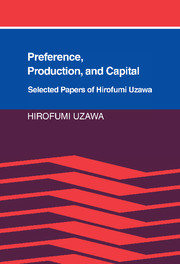Book contents
- Frontmatter
- Contents
- Foreword
- Preface
- I Preference and demand
- II Duality and production
- III Concave programming
- 8 The Kuhn-Tucker Theorem in concave programming
- 9 Iterative methods for concave programming
- 10 Prices of the factors of production in international trade
- IV Equilibrium and stability
- V Theory of economic growth
- VI Optimum growth
- Index
10 - Prices of the factors of production in international trade
Published online by Cambridge University Press: 04 May 2010
- Frontmatter
- Contents
- Foreword
- Preface
- I Preference and demand
- II Duality and production
- III Concave programming
- 8 The Kuhn-Tucker Theorem in concave programming
- 9 Iterative methods for concave programming
- 10 Prices of the factors of production in international trade
- IV Equilibrium and stability
- V Theory of economic growth
- VI Optimum growth
- Index
Summary
The problem of international factor-price equalization is studied by using a technique which combines the Walrasian theory of general equilibrium with the theory of welfare economics. The principle of the complete or partial equalization was first enunciated by Eli Heckscher in his 1919 paper and was later elaborated by Bertil Ohlin, Paul A. Samuelson, and others. The present study shows in particular that the complete factor-price equalization occurs only in the cases in which the factor endowments in the countries are precisely the ones that arise in an equilibrium position of world trade where the factors of production as well as the commodities can move internationally.
Introduction
In analyzing the effect of international trade on the prices of the factors of production, E. Heckscher found that the equalization of the absolute as well as the relative prices of factors of production is an inescapable consequence of international trade, provided that the same techniques of production are used in both countries and the supplies of the factors of production are fixed. Differences in techniques, however, lead to differences in factor prices ([4, p. 291]). (Following the tradition of the theory of international trade, he considers the two-commodity, two-factor, two-country case in which finished goods are traded between countries without any transport costs and in which factors of production are completely immobile.)
- Type
- Chapter
- Information
- Preference, Production and CapitalSelected Papers of Hirofumi Uzawa, pp. 149 - 172Publisher: Cambridge University PressPrint publication year: 1989



